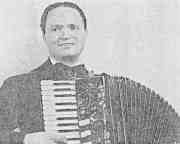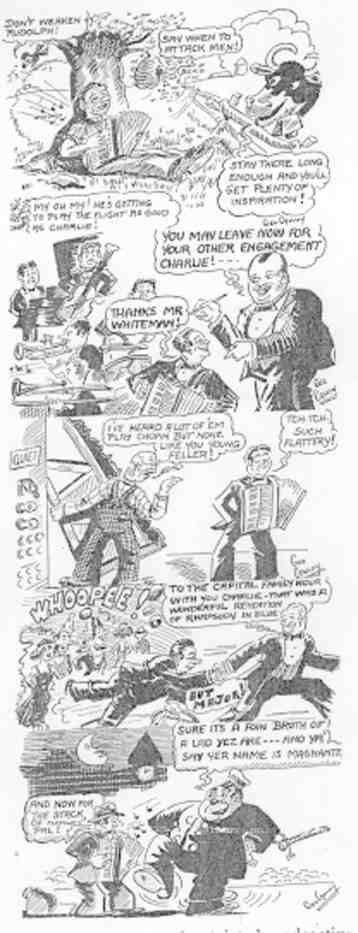The Free-Reed Journal
Articles and Essays Featuring Classical Free-Reed
Instruments and Performers
On the Firing Line
by Charles Magnante
This article was reprinted in its entirety from the
August 1940 issue of Accordion World (New York).
Editor's Note: Behind the seeming smoothness of performance in public and over the radio, many a tense moment crops up, demanding
trigger-action. Ye editor delves behind the scenes with Magnante and gives you in his own words some human interest episodes
in this outstanding artist's professional career - also interesting remarks about other celebrities.
 In the middle of an outstanding broadcast, part of a 45-piece orchestra misunderstood the conductor's signal; half repeating while the other half turned over and began playing another number in a different key. The conductor almost died of fright, but no sooner had I noticed something amiss than I dashed up to the microphone, playing the right number loudly, thus drowning out the entire orchestra until they could once again get together, when I gradually faded out.
In the middle of an outstanding broadcast, part of a 45-piece orchestra misunderstood the conductor's signal; half repeating while the other half turned over and began playing another number in a different key. The conductor almost died of fright, but no sooner had I noticed something amiss than I dashed up to the microphone, playing the right number loudly, thus drowning out the entire orchestra until they could once again get together, when I gradually faded out.
Erno Rapee regarded the accordion rather highly. In fact he had me play along with the Roxy Orchestra for eighteen weeks in the pit, giving
me the first and second violin parts and leaving how loud, etc.
Then I remember when a program was in full swing and the lights went out on the orchestra and singers. Having the accordion on and ready for the following number, I started to improvise, getting louder as the music and voices died out simulating a fadeout. Then when the lights went on I gradually died out and the orchestra and voices picked up and carried on. Several times when accompanying singers, for some unknown reason they started in another key, and were it not for my ability to transpose, several reputations, including my own would have had severe jolts.
Once while waiting to go on a Lucky Strike program, one of the piano keys broke and the whole key fell out into my hand. No other accordion was available. What to do? Suddenly there came the realization that I was chewing a real wad of gum, and in it went to plug up the hole. Maybe I didn't sweat during the acid test of playing an entire program without A natural and at the same time momentarily expected the gum to blow out .
That brings to mind the time I was playing a ritzy party when in the middle of a solo one of the bass buttons stuck. Did my heart stop beating a bit when I couldn't stop the unearthly droning. However, before it became apparent to the guests I modulated swiftly into the key of that button and started playing an Irish reel. The sudden change over did, however, stir up much interest and enthusiastic applause, as though in appreciation of my effort to put life into the party. I doubt whether any of them knew my predicament.

That makes me think of another party which perhaps had far reaching results about eight years ago at a party to Rube Goldberg, the cartoonist, there was considerable noise and inattention incident to drinking on the part of the guests. My efforts at playing were therefore more or less unnoticed until someone called the house to order to listen to the rendition of Rhapsody in Blue. PS It had been Major Bowes and soon thereafter I was invited to participate in the Capitol Family Hour. Coming home from another party in the wee hours of the morning during prohibition days, a husky Irish police recruit stopped me and demanded to know what was in the accordion case.
When I opened it, he looked dubiously at the accordion perhaps the first he had seen and demanded I lift it out. Even shaking it a bit didn't convince him I had no liquor inside the contraption, so to appease him I played an Irish jig and did I let myself in for it, because he demanded encores by which time other late comers gathered around and it was more than half an hour before I could proceed.
Once I played the Flight of the Bumble Bee in the presence of Rudolph Gaux. Upon completion he said he was going on a vacation and that of necessity he was now compelled to practice the number, since he had heard it really played.
Paul Whiteman was so enthused about my work on the accordion about ten years ago, that he rather would have me than anyone else at that time for the Old
Gold Program. A strict broadcasting. rule had to be broken too, so that I could leave about halfway through the program to fill another of longer standing.
After the Carnegie Hall Concert I received a compliment that meant more than many others - that from an old stage hand who had been in Carnegie Hall's service for 35 years. He told me he had heard every worthwhile piano in the world play Chopin but never effectively rendered as I had performed it that evening.
Roxy himself took an exceptional liking to the accordion; so much so that he put me in on the first appearance of the Roxy Gang, which engagement I retained until the Gang was disbanded.
And last I may mention a wonderful shepherd dog that we had years ago who was utterly indifferent to my playing and practicing, whether it was a couple of hours or a dozen or more a day. That is with one exception - a selection whose name I do not recall. Whenever and no matter how many times I played it, the dog howled during the entire number. I often wonder whether the dog was pleased or disgusted with that number, but he surely was faithful in carrying a husky counter melody!
The Classical Free-Reed, Inc. staff gratefully acknowledges
volunteer Benjamin Lang who assisted in
the production of this article, as well as Stanley Darrow and the comprehensive American Accordion Musicological Society library.
 In the middle of an outstanding broadcast, part of a 45-piece orchestra misunderstood the conductor's signal; half repeating while the other half turned over and began playing another number in a different key. The conductor almost died of fright, but no sooner had I noticed something amiss than I dashed up to the microphone, playing the right number loudly, thus drowning out the entire orchestra until they could once again get together, when I gradually faded out.
In the middle of an outstanding broadcast, part of a 45-piece orchestra misunderstood the conductor's signal; half repeating while the other half turned over and began playing another number in a different key. The conductor almost died of fright, but no sooner had I noticed something amiss than I dashed up to the microphone, playing the right number loudly, thus drowning out the entire orchestra until they could once again get together, when I gradually faded out.
